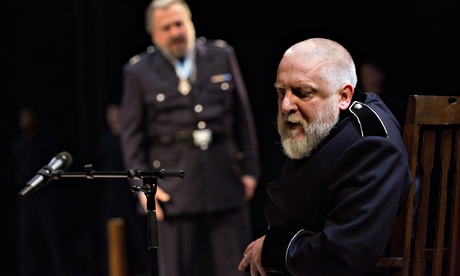‘Speak the speech, I pray you, as I pronounced it to you, trippingly on the tongue.” So says Hamlet to the players. But has his advice gone unheeded at a time when Shakespearean verse-speaking is widely held to be in decline? The RSC clearly thinks there is an issue as it has set up a Shakespeare “gym” in Stratford-upon-Avon to ensure, in the words of its artistic director Gregory Doran, “Everyone has the iambic pentameter in their bloodstream.” That’s a welcome trend, but I suspect the crisis goes deeper than that – and that classic texts are often regarded as alien, hostile territory.
There was a time when actors, however experienced, were ready to learn. When Eileen Atkins joined the National Theatre in 1988 for a season of Shakespeare’s late plays, Peter Hall, its director, offered the company a voluntary class in verse-speaking. Atkins was the only one to enlist and had two hours of solo tuition from Hall that changed her approach. She acquired all there was to know about respecting the sanctity of the line, using a rhyme and not overdoing the caesura, or break. She cites an example from The Winter’s Tale where Paulina, rebuked for the boldness of her speech, says: “I am sorry for’t.” What Atkins learned from Hall was that there must be no break in the previous speaker’s rhythm before Paulina speaks her half-line.
Hall was adept at conveying the musicality, as well as the sense, of a Shakespeare text. But while he proudly called himself an “iambic fundamentalist”, it strikes me that great actors instinctively flout the rules. One of Hall’s precepts was “to play lines rather than words”, yet Laurence Olivier was a master at isolating a crucial word or phrase.
When Macbeth says he will never enjoy everything that should accompany old age – “As honour, love, obedience, troops of friends” – Olivier seized on the last three words and allowed his voice to soar in an agony of desolation. In our own time, Simon Russell Beale has a rare gift for ironising or reimagining a familiar speech. Prospero’s “Our revels now are ended” became, in his hands, less a philosophic vision of the universe than a father’s angry response to the realisation that his daughter was intemperately snogging the newly discovered Ferdinand.
Like a jazz trumpeter, an actor has to know the rules in order to bend them. Have we now, however, reached a point where young actors are, literally, unversed in Shakespeare? Paul Miller, who has directed Shakespeare at Sheffield and Chichester and who runs the Orange Tree theatre in London, attaches no blame to the actors. “The real problem,” he says, “lies in the lack of practice. The training at drama school is as good as ever, but if a young actor goes into television or film, he or she doesn’t get the chance to stretch their vocal muscles.
“Even in the reps, there is much less Shakespeare, largely for economic reasons, than there used to be. But I think we should be wary of this phrase ‘Shakespearean verse-speaking’. It is often used by audiences hankering for a mythical golden age of the voice beautiful and received pronunciation. The fact is, as the culture changes, there has been a tectonic shift in the approach to verse-speaking.”
But has it been a shift for the better or the worse? One idea that should be quickly scotched is that diversity in casting has diluted the quality of verse-speaking. When Paapa Essiedu led a predominantly black ensemble in an RSC Hamlet in 2016, there was a springy alertness to the language that was ear-opening: I have not forgotten how Essiedu pointedly said to Gertrude: “I shall in all my best obey YOU, madam,” in implicit rebuke to the tyrannical Claudius.
One of the best-spoken Shakespeares of recent times was last year’s Richard II at the Sam Wanamaker Playhouse in London, with a cast entirely composed of women of colour. They made us listen so intently that when Doña Croll’s John of Gaunt declared “That England, that was wont to conquer others / Hath made a shameful conquest of itself” the audiences let out a roar in recognition of the lines’ relevance to the country’s Brexit-induced paralysis.
Diversity is not the issue. The big question is whether there is a more general lack of relish for language and an unfamiliarity with classic texts. I suspect there is for a host of reasons. We live in a culture that prioritises the visual over the verbal.
In purely theatrical terms, we have seen a narrowing of the repertoire and a decline of the company-based regional rep. I chanced the other day on a brochure for the Cambridge Theatre Company that, during the 1970s, produced plays not just by Shakespeare, Chekhov and Ibsen but by Jonson, Sheridan, Goldsmith, Shaw and Wilde as well as Pirandello, Brecht and Beckett. Where today would you find a company that offered actors, and audiences, such a rich range?
I am all for modernity and new writing. But the much-debated crisis in Shakespearean verse-speaking conceals a wider malaise: that we are living with a theatre increasingly cut off from its past.










